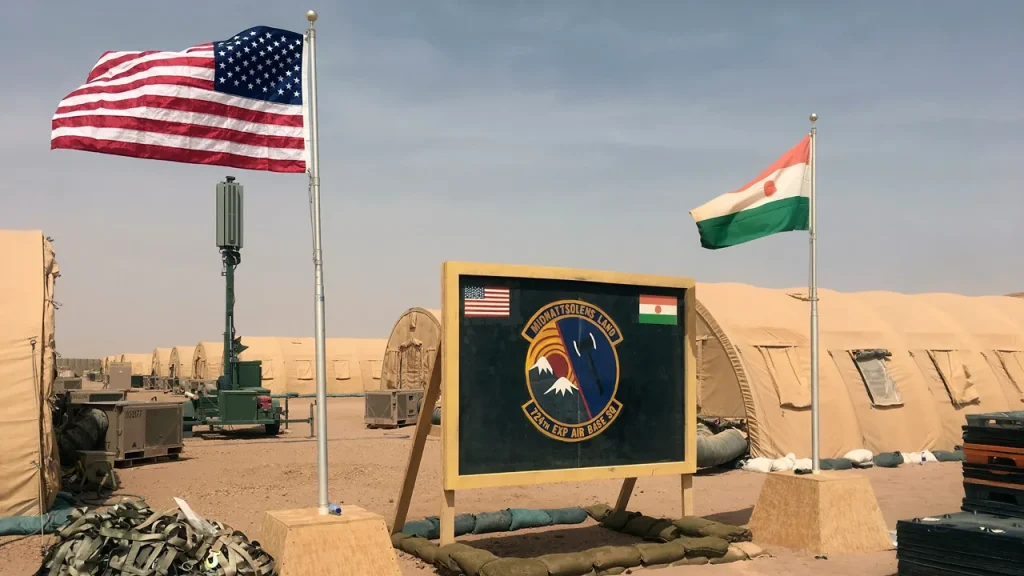From Intelligence Gaps to Rising Terror: The U.S. Withdrawal from Niger’s Impact on Counterterrorism
In a concerning development for U.S. counterterrorism efforts in West Africa, American troops combating al Qaeda and ISIS in Niger and neighboring countries are reportedly operating “completely blind” following a diplomatic fallout between Washington and Niger’s government. According to a former senior State Department official, this intelligence gap stems from policy decisions made by the Biden administration that led to the withdrawal of U.S. forces from two strategic airbases in Niger by September 2023. The consequences became starkly apparent following the October 21 kidnapping of an American missionary, with Pentagon officials now describing the region as “a black hole” in terms of intelligence gathering capabilities. The bases had previously provided crucial surveillance through drone operations that could penetrate dense forest cover to locate terrorist groups – technology that proved vital in 2020 when SEAL Team Six successfully rescued another American kidnapped in Niger during the Trump administration.
The diplomatic breakdown that precipitated this withdrawal reportedly occurred in March 2023 during a high-stakes meeting between U.S. and Nigerien officials. According to Niger’s government spokesperson Amadou Adramane, who addressed the nation on television following the encounter, American representatives displayed a “condescending attitude” accompanied by “threats of retaliation.” The delegation, led by then-Assistant Secretary of State Mary “Molly” Phee, allegedly demanded that Niger cease relations with Russia and Iran or face sanctions. Multiple sources described Phee’s approach as confrontational, with one claiming she “flame sprayed” Niger’s military leadership. For her part, Phee defended her conduct, telling Fox News Digital that she was “following Biden administration policy” and executing “a proposal developed and approved by the White House,” while suggesting the Nigerien junta employed “a misogynistic trope to deflect legitimate concerns about their conduct.”
The consequences of this diplomatic failure have been severe and immediate. Within months of the contentious meeting, all U.S. personnel and surveillance drones had departed Niger, effectively removing America’s “eyes in the sky” over this critical region. Marine Corps General Michael Langley, then commander of U.S. Africa Command (AFRICOM), publicly acknowledged the resulting security deterioration at an African Chiefs of Defense Conference in May. He noted a troubling rise in attacks by violent extremist organizations across the Sahel region since the U.S. withdrawal, affecting not only Niger but also Nigeria, Burkina Faso, and Mali. The general emphasized that terrorist groups have significantly increased both their capabilities and weaponry, concluding ominously that “with our withdrawal from the region, we have lost our ability to monitor these terrorist groups closely.”
The resource constraints facing American counterterrorism efforts in Africa compound this challenge. A U.S. military source revealed to Fox News Digital that AFRICOM operates with severely limited resources, maintaining only one major base in Djibouti and smaller forces in Somalia and Kenya. Despite Africa representing one of the largest land masses with multifaceted security threats from Russia, China, drug trafficking, and terrorism, AFRICOM reportedly receives “less than 1% of the Department of War’s budget.” The source lamented that “since the previous administration lost us access to Niger, the Americans and Western powers are completely blind and unable to quickly react to anything,” creating a dangerous security vacuum that adversaries are eager to fill.
This intelligence gap has immediate human consequences, particularly for the recently kidnapped American missionary. While U.S. special operations forces like SEAL Team Six theoretically have the capability to conduct another rescue operation, military sources emphasize that such missions first require precise intelligence about the victim’s location – intelligence that has become exceedingly difficult to gather without the surveillance infrastructure previously established in Niger. Analysts note that even America’s satellite capabilities provide limited effectiveness in the Sahel’s challenging environmental conditions, making tracking kidnap victims “difficult to impossible… first we have to find the guy,” according to military sources familiar with the situation. This represents a stark contrast to the 2020 hostage rescue, when U.S. drone surveillance likely played a critical role in locating the victim.
The State Department has responded to the deteriorating security situation by issuing its highest possible travel advisory for Niger, explicitly warning Americans: “Do not travel to Niger for any reason due to crime, unrest, terrorism, health, and kidnapping.” This stark warning underscores the gravity of the situation as jihadist groups expand their operations across the region with decreased American monitoring and counterterrorism capability. The human cost of this intelligence gap extends beyond American citizens to the millions of people across the Sahel facing increased terrorist violence. Meanwhile, regional powers like Russia have moved to fill the security vacuum left by Western forces, further complicating an already volatile geopolitical landscape. As the search for the kidnapped American missionary continues without the surveillance tools previously available, the situation highlights the complex interplay between diplomatic relationships, resource allocation, and counterterrorism effectiveness in one of the world’s most challenging security environments.


